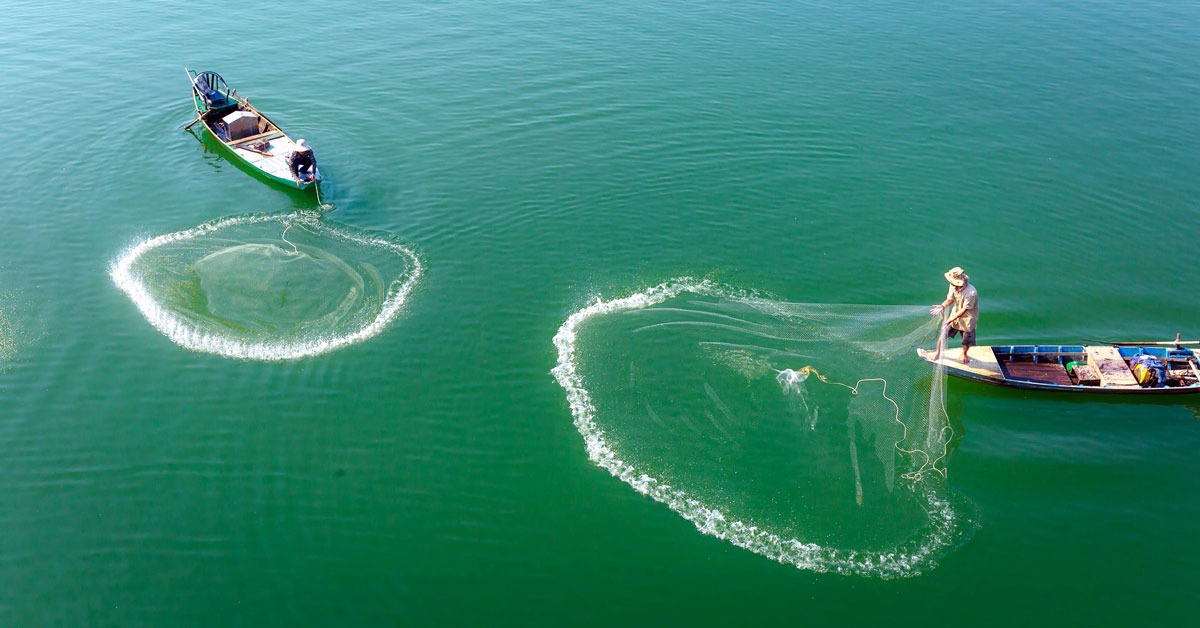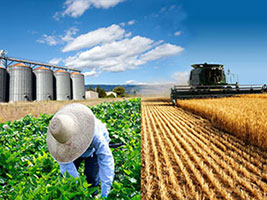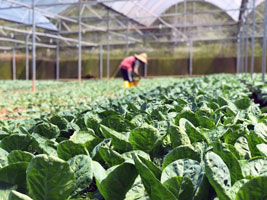Careers in agriculture, forestry, fisheries and veterinary
by StudyMalaysia.com on January 22, 2020 | Top Stories, Career Guide

Could you imagine if we had to grow our own vegetables and raise our own animals for food? Surely we would not be able to do it as effectively without the special knowledge that farmers and other agricultural specialists need. The agriculture, forestry, fisheries and veterinary industry is a very important part of our economy and our lives. It supplies us with a wide variety of food products and non-food products like wood, fibre and other resources.
Advancements in technology means the way we produce crops, livestock and fish keeps changing. If you love the idea of working with crops, animals and resources that contribute to the worldwide food supply, you could consider pursuing a career in the agriculture, forestry, fisheries and veterinary industry.
| If you’re interested in… | You can consider becoming a/an… |
|---|---|
AgricultureAgricultural workers include occupations that perform a whole range of jobs involved in crop and livestock production. On the farm, workers plant, maintain, and harvest food crops; apply pesticides, herbicides, and fertilizer to crops; and cultivate plants used to beautify landscapes. Some workers grade, sort, or classify unprocessed food and other agricultural products by size, weight, colour, or condition.Those who care for animals (e.g. cattle, sheep, swine, goats, horses, poultry, finfish, shellfish, and bees) have duties that include feeding, watering, herding, grazing, castrating, branding, weighing, catching, and loading animals. They also maintain records on animals, examine animals to detect diseases and injuries, assist in birth deliveries, and administer medications and vaccinations. |
|
ForestryForest workers carry out a variety of tasks to reforest and conserve timberlands and maintain forest facilities. They may plant tree seedlings to reforest timberland areas, remove diseased or undesirable trees, and spray trees with insecticides.Some work in industries that produce lumber. They operate a variety of equipment and heavy machinery to cut down trees and process them, and transport them to sawmill and paper mills. This sector includes landscapers who work with green spaces such as parks and gardens. Other forest and conservation workers work in forest nurseries or laboratories. |
|
FisheriesFishers and related fishing workers use nets, fishing rods, or other equipment to catch and trap various types of marine life for human consumption, animal feed, bait, and other uses.Fishing workers harvest fish in fresh water and the ocean. Some may work on small fishing boats, or on big commercial fishing vessels catching thousands of fish and several varieties. Workers in aquaculture farming also raise species of fish and shellfish in similar conditions as their natural environments for harvesting or recreational fishing areas. |
|
VeterinaryVeterinary workers treat the injuries and illnesses of pets and other animals with a variety of medical equipment, including surgical tools and x-ray and ultrasound machines.Their job includes examining animals to diagnose their health problems, treating and dressing wounds, performing surgery on animals, testing for and vaccinating against diseases, operating medical equipment such as x-ray machines, advising animal owners about the care of their animals, prescribing medication, and others. |
|
Here are examples of careers in this field of study and a brief description of job tasks you can expect.
| Career | Brief job description |
|---|---|
| Agriculture | |
| Agricultural inspector | Agricultural inspectors scrutinize all agricultural food products and processing methods to ensure that these products are safe to eat or drink. When they discover a problem, the agricultural inspector must swiftly take action to ensure that the issue is remedied before contaminated products are sold to the public. They also interpret and enforce government acts and regulations and explain required standards to agricultural workers. |
| Agricultural technician | Record data pertaining to experimentation, research, or animal care. Measure or weigh ingredients used in laboratory testing. Prepare data summaries, reports, or analyses that include results, charts, or graphs to document research findings and results. Set up laboratory or field equipment as required for site testing. Prepare laboratory samples for analysis, following proper protocols to ensure that they will be stored, prepared, and disposed of efficiently and effectively. |
| Animal breeder | Animal breeders select and breed animals according to their genealogy, characteristics, and offspring. They feed and water animals, and clean and disinfect pens, cages, yards, and hutches. Treat minor injuries and ailments and contact veterinarians to obtain treatment for animals with serious illnesses or injuries. May involve keeping records on heats, birth intervals, or pedigree. |
| Animal scientist | Study nutritional requirements of animals and nutritive values of animal feed materials. Advise producers about improved products and techniques that could enhance their animal production efforts. Develop improved practices in feeding, housing, sanitation, or parasite and disease control of animals. Write up or orally communicate research findings to the scientific community, producers, and the public. Study effects of management practices, processing methods, feed, or environmental conditions on quality and quantity of animal products, such as eggs and milk. |
| Buyers and purchasing agents for farm products | Purchase, for further processing or for resale, farm products, such as milk and grains. Arrange for processing or resale of purchased products. Negotiate contracts with farmers for the production or purchase of farm products. Arrange for transportation or storage of purchased products. Maintain records of business transactions and product inventories, reporting data to companies or government agencies as necessary. |
| Farmer and other agricultural managers | Plan, direct, or coordinate the management or operation of farms, ranches, greenhouses, nurseries, or other agricultural establishments. May hire, train, or supervise farm workers or contract for services to carry out the day-to-day activities of the managed operation. May engage in or supervise planting, cultivating, harvesting, financial, or marketing activities. |
| Food science technician | Perform standardised qualitative and quantitative tests to determine physical or chemical properties of food or beverage products. Maintain records of testing results or other documents as required by state or other governing agencies. Taste or smell foods or beverages to ensure that flavours meet specifications or to select samples with specific characteristics. |
| Soil and plant scientist | Conduct research in breeding, physiology, production, yield, and management of crops and agricultural plants or trees, shrubs, and nursery stock, their growth in soils, and control of pests; or study the chemical, physical, biological, and mineralogical composition of soils as they relate to plant or crop growth. May classify and map soils and investigate effects of alternative practices on soil and crop productivity. |
| Forestry | |
| Forest and conservation technician | Provide technical assistance regarding the conservation of soil, water, forests, or related natural resources. May compile data pertaining to size, content, condition, and other characteristics of forest tracts, under the direction of foresters; or train and lead forest workers in forest propagation, fire prevention and suppression. May assist conservation scientists in managing, improving, and protecting rangelands and wildlife habitats. |
| Forest and conservation worker | Perform manual labour necessary to develop, maintain, or protect areas such as forests, forested areas, woodlands, wetlands, and rangelands through such activities as raising and transporting seedlings; combating insects, pests, and diseases harmful to plant life; and building structures to control water, erosion, and leaching of soil. Includes forester aides, seedling pullers, and tree planters. |
| Forest fire inspectors and prevention specialists | Enforce fire regulations, inspect forest for fire hazards and recommend forest fire prevention or control measures. Relay messages about emergencies, accidents, locations of crew and personnel, and fire hazard conditions. Conduct wildland firefighting training. Estimate sizes and characteristics of fires, and report findings. Direct crews working on firelines during forest fires. |
| Foresters | Manage public and private forested lands for economic, recreational, and conservation purposes. May inventory the type, amount, and location of standing timber, appraise the timber's worth, negotiate the purchase, and draw up contracts for procurement. May determine how to conserve wildlife habitats, creek beds, water quality, and soil stability, and how best to comply with environmental regulations. May devise plans for planting and growing new trees, monitor trees for healthy growth, and determine optimal harvesting schedules. |
| Park naturalist | Plan, develop, and conduct programmes to inform public of historical, natural, and scientific features of national, state, or local park. Prepare and present illustrated lectures and interpretive talks about park features. Plan and organize public events at the park. Provide visitor services, such as explaining regulations, answering visitor requests, needs and complaints, and providing information about the park and surrounding areas. |
| Fisheries | |
| Aquacultural manager | Direct and coordinate, through subordinate supervisory personnel, activities of workers engaged in fish hatchery production for corporations, cooperatives, or other owners. Grow fish and shellfish as cash crops or for release into freshwater or saltwater. Monitor environments to ensure maintenance of optimum conditions for aquatic life. |
| Aquacultural workers | Record the numbers and types of fish or shellfish reared, harvested, released, sold, and shipped. Direct and monitor worker activities, such as treatment and rearing of fingerlings, maintenance of equipment, and harvesting of fish or shellfish. Observe fish and beds or ponds to detect diseases, monitor fish growth, determine quality of fish, or determine completeness of harvesting. Train workers in spawning, rearing, cultivating, and harvesting methods, and in the use of equipment. |
| Fisherman/ Fishers | Use nets, fishing rods, traps, or other equipment to catch and gather fish or other aquatic animals from rivers, lakes, or oceans, for human consumption or other uses. Steer vessels and operate navigational instruments. Put fishing equipment into the water and anchor or tow equipment, according to the fishing method used. Maintain engines, fishing gear, and other on-board equipment and perform minor repairs. Sort, pack, and store catch in holds with salt and ice. |
| Veterinary | |
| Companion animal veterinarian | Companion animal veterinarians treat pets and generally work in private clinics and hospitals. They most often care for cats and dogs, but also treat other pets, such as birds, ferrets, and rabbits. These veterinarians diagnose and provide treatment for animal health problems, consult with owners of animals about preventative health care, and carry out medical and surgical procedures, such as vaccinations, dental work, and setting fractures. |
| Food animal veterinarian | Food animal veterinarians work with farm animals such as pigs, cattle, and sheep. They spend much of their time at farms and ranches treating illnesses and injuries and testing for and vaccinating against disease. They may advise owners or managers about feeding, housing, and general health practices. |
| Food safety and inspection veterinarian | Food safety and inspection veterinarians inspect and test livestock and animal products for major animal diseases, provide vaccines to treat animals, enhance animal welfare, conduct research to improve animal health, and enforce government food safety regulations. They design and administer animal and public health programs for the prevention and control of diseases transmissible among animals and between animals and people. |
| Research veterinarian | Research veterinarians work in laboratories, conducting clinical research on human and animal health problems. These veterinarians may perform tests on animals to identify the effects of drug therapies, or they may test new surgical techniques. They may also research how to prevent, control, and eliminate food- and animal-borne illnesses and diseases. |
| Veterinarian | Diagnose, treat, or research diseases and injuries of animals. Includes veterinarians who conduct research and development, inspect livestock, or care for pets and companion animals. Examine animals to detect and determine the nature of diseases or injuries. Treat sick or injured animals by prescribing medication, setting bones, dressing wounds, or performing surgery. Collect body tissue, faeces, blood, urine, or other body fluids for examination and analysis. Inoculate animals against various diseases, such as rabies or distemper. |
| Veterinary assistant and laboratory animal caretaker | Feed, water, and examine pets and other nonfarm animals for signs of illness, disease, or injury in laboratories and animal hospitals and clinics. Clean and disinfect cages and work areas, and sterilize laboratory and surgical equipment. May provide routine post-operative care, administer medication orally or topically, or prepare samples for laboratory examination under the supervision of veterinary or laboratory animal technologists or technicians, veterinarians, or scientists. |
| Veterinary technologist and technician | Perform medical tests in a laboratory environment for use in the treatment and diagnosis of diseases in animals. Prepare vaccines and serums for prevention of diseases. Prepare tissue samples, take blood samples, and execute laboratory tests, such as urinalysis and blood counts. Clean and sterilize instruments and materials and maintain equipment and machines. May assist a veterinarian during surgery. |
Copyright © StudyMalaysia Sdn Bhd (869848-W) & StudyMalaysia.com (September, 2019)
Related Articles:
You May Also Be Interested In...
20 great jobs to consider if you have good social skills
![20 great jobs to consider if you have good social skills - StudyMalaysia.com]() Do you like serving as a volunteer or facilitator at a youth camp? Are...
Do you like serving as a volunteer or facilitator at a youth camp? Are...The cost of higher education in Malaysia
![The cost of higher education in Malaysia - StudyMalaysia.com]() One of the many reasons why international students choose Malaysia is ...
One of the many reasons why international students choose Malaysia is ...Why Study Mass Communication at SEGi
![Why Study Mass Communication at SEGi - StudyMalaysia.com]() Mass communication is an exciting and fast-paced field with a wide sel...
Mass communication is an exciting and fast-paced field with a wide sel...A sweet date this Raya - Raisin Oatmeal and Date Cookies
![A sweet date this Raya - Raisin Oatmeal and Date Cookies - StudyMalaysia.com]() It’s time to crank up the oven and get your siblings, friends and co...
It’s time to crank up the oven and get your siblings, friends and co...Scholarships with September & October 2018 Deadlines
![Scholarships with September & October 2018 Deadlines - StudyMalaysia.com]() Attention school leavers! Applying for scholarships? Check this list f...
Attention school leavers! Applying for scholarships? Check this list f...�Why make Malaysia your destination of choice when studying abroad
![�Why make Malaysia your destination of choice when studying abroad - StudyMalaysia.com]() 12th most preferred education destination in the world among internati...
12th most preferred education destination in the world among internati...
































